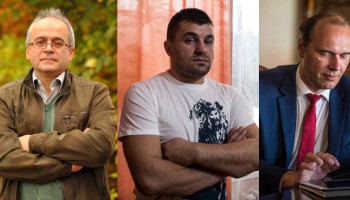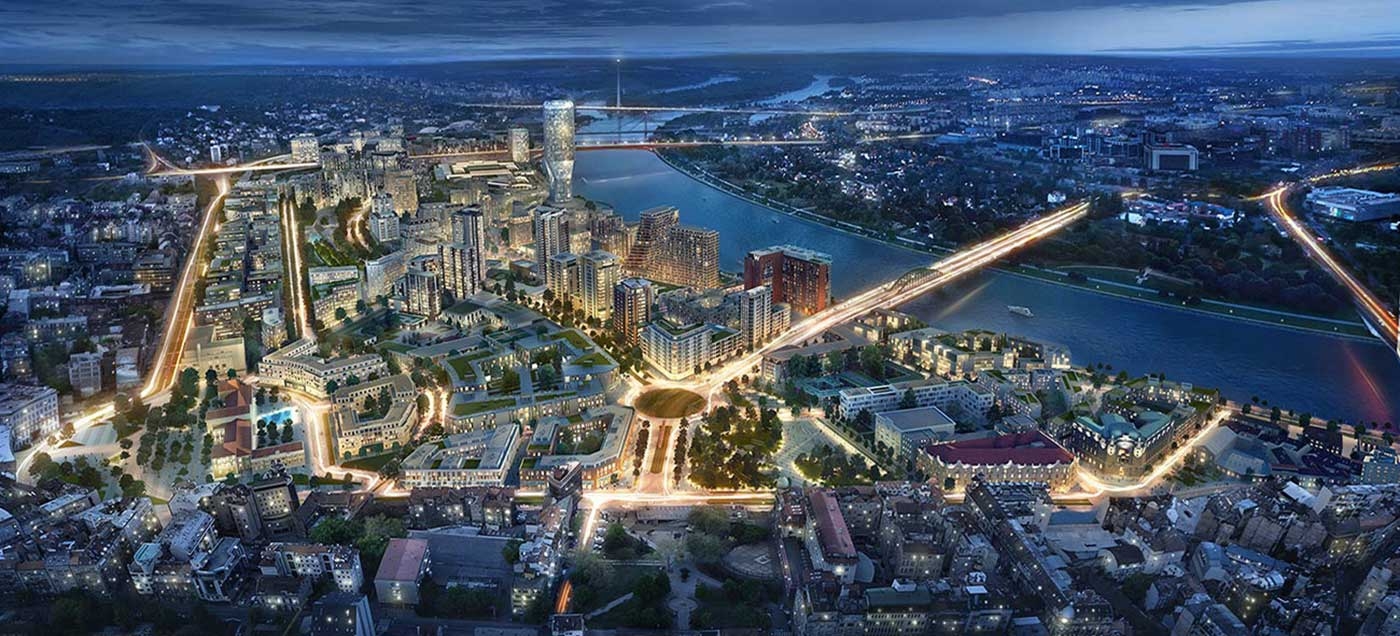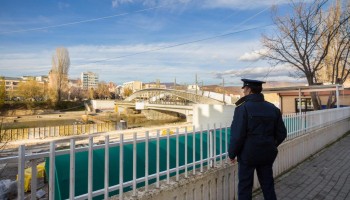It was 4.30 a.m. when a phone call pulled her out of bed.
“Nada, they've demolished everything,” yelled a breathless voice on the line. “Your restaurant too. Come quickly!” It was the employee of a company located near her barbeque restaurant, Savski Ekspres.
It took Nada Krstic a few moments to grasp what he was saying.
“I thought he was joking,” she told KRIK, OCCRP’s partner in Serbia.
Savamala, the downtown Belgrade neighborhood where her restaurant was located, has been at the center of a dispute between residents on one side and business owners and the government on the other.
The city’s plan was to construct a modern residential and business complex called "Belgrade Waterfront" in partnership with an investor from the United Arab Emirates.
By April 2016, the authorities had already began demolishing buildings on Hercegovacka Street to clear the way for what the government claimed would be the realization of the long-standing dream of many Belgrade citizens - that the city center moves to the riverbanks of the Sava and the Danube.
In reality, many residents of Serbia’s capital fiercely opposed the project, suspecting that it was the result of a corrupt business deal. If something had to change, they would have preferred that the neighborhood be turned into a park instead of another complex of skyscrapers.
“Don’t strangle Belgrade,” they chanted, taking their protest to the street months before the demolitions.
A number of families were evicted -- but Krstic and the owners of a few other buildings refused to leave. Their properties were built without permit but in the process of getting one and Krstic knew that, according to the law, the authorities couldn’t tear them down until the procedure was completed.
Or could they?
Adrenaline rushed through the 64 year-old woman’s body as she hung up the phone. She dialed the police.
“I reported a robbery and they told me it wasn’t a break-in. ‘Your property is demolished,’” she recalls how they justified their claim that her case was not their responsibility.
Krstic rushed to Savamala. But when she arrived, her heart dropped to her stomach. Savski Expres had turned into a pile of rubble. She recognized parts of her kitchen.
There had been no warning. No consultation.
“If we only knew, if somebody had told us, ... the inventory, the goods, everything was destroyed,” she remembers.
Savski Ekspres was not like the luxury restaurants that had opened in Belgrade in recent years. With its inconspicuous exterior and outdated interior, the place was famous for its traditional cuisine and abundant portions. Krstic says that her restaurant was one of the few where the regulars included workers, chauffeurs, lawyers, judges, inspectors, and police officers.
She had opened the restaurant in 1996 to support her family, making an investment of €50,000. Despite the blue synthetic curtains and the forgotten Christmas decoration hanging from a fake fireplace - as one blogger remembered - business boomed. The focus was on the food.
Then, in the early hours of April 25, 2016, as the votes from the previous day’s parliamentary elections were being counted and Serbia awaited the results, balaklava-clad men driving black cars with tinted windows and covered license plates arrived in Savamala.
They rounded up the few early-morning passersby, took their mobile phones, and locked them into a shed. Trucks blocked the street. Then the bulldozers got to work, razing Krstic’s restaurant and the surrounding buildings.
The police never came. Based on recordings of police operators’ calls to their bosses, Serbia’s ombudsman concluded that the police had orders not to intervene -- and had violated the law.
Krstic was still digging through the ruins when the election results were announced. Aleksandar Vucic, Serbia’s governing prime minister, won a convincing victory. A day later, she learned that it was Vucic’s ally, Belgrade mayor Sinisa Mali, who had orchestrated the demolitions.
“When officials from the municipality came, I asked them: Why didn’t you inform us, so we could at least rescue the inventory?” Krstic recalls.
They told her they were no less surprised. “They said this was done by Sinisa. Ask him,” she says.
A few days later, Vucic said publicly that the city’s top authorities were behind the demolition, but didn’t mention any names.
In an interview with KRIK in February 2017, the mayor's ex-wife said that he had bragged to her that he had organizing the demolition himself, and that he had done it for the "Belgrade Waterfront" project.
To this day, Krstic has received no official notice about who was to blame, let alone any compensation. But she did get heart arrhythmia, and most likely, she will soon have to say goodbye to her son. He wants to leave Serbia, and she understands.
“It's hard to live in this country,” she says. “I was lucky to retire and have some income, but it’s not enough for a normal life.”
What is left of Savski Ekpress?
A few photos, a recommendation on TripAdvisor that describes giant portions of excellent food, and a website that says: permanently closed.
And Krstic’s memories.
Vucic himself once came to her restaurant with some friends for beers and cevapi, a popular Balkan dish of grilled sausages.
“It must have been 18 years ago,” she remembers. “They sat down and he said to them: 'Once I’m in power, I will demolish all this and create a miracle here,'” she cites him with a bitter laugh.
“I stood at the bar and I thought to myself: This one will really bring us down.”
This project is part of the Global Anti-Corruption Consortium, a collaborative effort between OCCRP and Transparency International to fight corruption by combining investigative journalism and grassroots activism.






